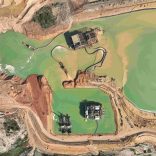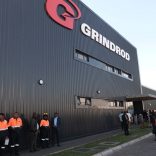Eni to spend $3B on Mozambican local content through Coral project
Mozambican Hydrocarbons Company CMH reports profit in year to June down 15.5%

FILE - CMH is a subsidiary of ENH and Mozambican partner of Sasol in the Pande and Temane natural gas project, where Sasol is the operator [File photo: Sasol]
Profits at Mozambique state oil and gas enterprise Companhia Moçambicana de Hidrocarbonetos (CMH) in the fiscal year that ended in June were down 15.5%, to $54.7 million (€48.1 million), according to figures in the company’s annual report and accounts.
“Our operations were conditioned by various exogenous factors, in an environment influenced by the current international geopolitical situation,” the message from the board of directors of the Mozambican Hydrocarbons Company – CMH in the report warns. “Fluctuations in the prices of reference commodities on the international market and the decline in initial reserves also influenced our performance.”
In the financial year ending June 2023, CMH had profits of $64.8 million (€58.1 million), an increase of 75% compared to the previous period.
In this latest report, the management admits that “other factors” – mainly operational – had “an impact on the production volumes of natural gas and condensate at the Temane Production plant” that had a “considerable impact on revenue levels compared to the 2023 financial year.
“The weight of investments in future budgets will have an impact on our revenues in a context where our reservoirs are being depleted, which could impact natural gas production,” the message reads. “In this context, we are committed to developing and implementing investment actions to sustain long-term production and supply of natural gas, within the scope of commercial commitments under current contracts.”
CMH carries out hydrocarbon production operations and is controlled by the state-owned Empresa Nacional de Hidrocarbonetos, which holds 70% of its share capital and was appointed by Mozambique’s government, together with South Africa’s Sasol Petroleum Temane (SPT), to conduct oil operations in the areas of the Pande and Temame production fields, for a period of 30 years, under an oil production agreement signed in October 2000.
The company is also part of the joint operations agreements signed with SPT (Sasol Petroleum Temane ) in December 2002, covering the reservoirs of the Pande and Temame gas fields, since the company only produces and sells gas and operates in an integrated manner.
In its annual report for the year ending at the end of June, CMH’s management highlights the execution of additional boreholes (PEDOP-infill) and compression projects under the Plateau Extension and Decline Optimisation Programme (PEDOP), which “will involve the execution of three new boreholes and the installation of five additional compressors.
“They represent a great magnitude in terms of investment costs and risks in their implementation in the case of the low-pressure compression project on the Pande line, as the latter is still dependent on the government’s approval of the development plan and the final investment decision by the partners, which must be reached in time so as not to jeopardise the benefit of operations in 2026 and revenues for the consortium from 2027 onwards,” it states.
To meet these challenges, the board recalls, CMH secured a medium-term credit line of $50 million (€44.9 million) with commercial banks to finance participation in the project.
CMH closed the financial year ending 30 June with $378.8 million (€340 million) in total assets, down from the previous year, but against liabilities that also fell in the period to $116.8 million (€104.8 million).












Leave a Reply
Be the First to Comment!
You must be logged in to post a comment.
You must be logged in to post a comment.